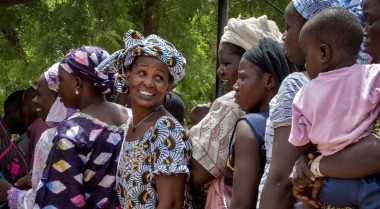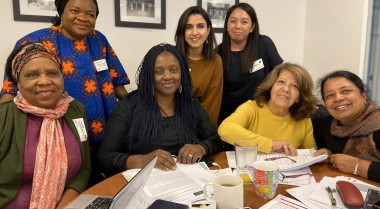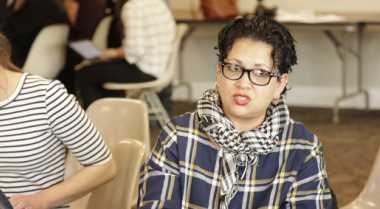Reflecting on Women, Peace and Security in 2020
2020 has been a milestone year for the Women, Peace and Security Agenda. In October, UN Security Council Resolution 1325 celebrated its twentieth anniversary, this presented an important opportunity to reflect on the progress made as well as on the persisting challenges faced by the Agenda. This reflective process culminated in the annual Open Debate on Women, Peace and Security (WPS) which took place on 29 October under the Presidency of Russia.
Ahead of the anniversary, we at GPPAC hosted an event on “Committing to Women’s Leadership in Peacebuilding: Bringing WPS and the UN Peacebuilding Architecture Closer Together”. The virtual side-event, which featured interventions from four gender experts from Lebanon, Georgia, Cameroon and Fiji, focused on strengthening the connections between the WPS and Sustaining Peace frameworks. The discussion generated a number of recommendations, most prominently: for the UN to stop supporting peace agreements that do not meaningfully include women; for the donor community to make funding flexible and sustainable , including core funding, available to women peacebuilders; for member states and the UN to document the work of women peacebuilders and improve data collection; and for the WPS agenda to be understood and operationalized in the context of other key policy frameworks such as Sustaining Peace.
This year’s Open Debate, like the events leading up to it, took place online. Unlike previous years, the only speakers were members of the Security Council, while other actors who traditionally take part in the Open Debate submitted written statements. In addition to member states, the Secretary General, the Civil Society briefer on behalf of the NGO Working Group on Women Peace and Security Zarqa Yaftali, and the Executive Director of UN Women had the opportunity to speak. In her statement, Yaftali discussed the toll the conflict in Afghanistan has taken on women. She called for the Security Council to demand an immediate ceasefire and insist on women’s participation in the ongoing peace process. A number of member states made key monetary and policy-related commitments. Notably, the United Kingdom, penholder of Resolution 1325, pledged £1 million to women mediators across the Commonwealth as well as a quarter of a million pounds toward research on the gendered impacts of Covid-19 in fragile and conflict affected states. Germany, on the other hand, committed to making WPS training compulsory for diplomats and making WPS a key component of its foreign policy. In addition to this, numerous states, including France, Tunisia, Estonia and South Africa, reported recently adopting a first or new National Action Plan.
As President of the UN Security Council in the month of October, Russia proposed another WPS Resolution. Since its announcement and throughout the drafting process, concerns were raised by member states and international civil society about the proposed resolution not advancing the WPS Agenda and lacking reference to key issues. These concerns were reflected in the statements made during the debate that any “any roll-back on the progress made on women’s rights in the past 20 years” would not be accepted. This, along with the shared belief that WPS agenda requires better implementation rather than additional resolutions, led ten Security Council members to abstain from voting, resulting in the resolution being scrapped.
Moving forward, the primary focus will be on implementing existing WPS commitments. To this end, new institutions are emerging, among them the Women, Peace and Security and Humanitarian Action Compact. The compact will establish a voluntary multi-stakeholder monitoring and accountability process to help narrow the gap between aspirations and concrete actions on WPS and humanitarian action. GPPAC has joined the Compact as a Catalytic Member. This position will enable us to bring our members’ work and expertise on conflict prevention and peacebuilding into feminist spaces. Furthermore, it gives us a chance to engage with the inclusive peace-development-humanitarian nexus to a greater extent.
The anniversary of Resolution 1325 provided an opportunity to reflect on how far we’ve come. As we continue to strive for the full implementation of the WPS Agenda, GPPAC commits to working and advocating for better integration of WPS into the UN Peacebuilding Architecture. Women peacebuilders around the world are hard at work to prevent conflict and sustain peace within their communities. This work must be recognized, documented and properly funded.


